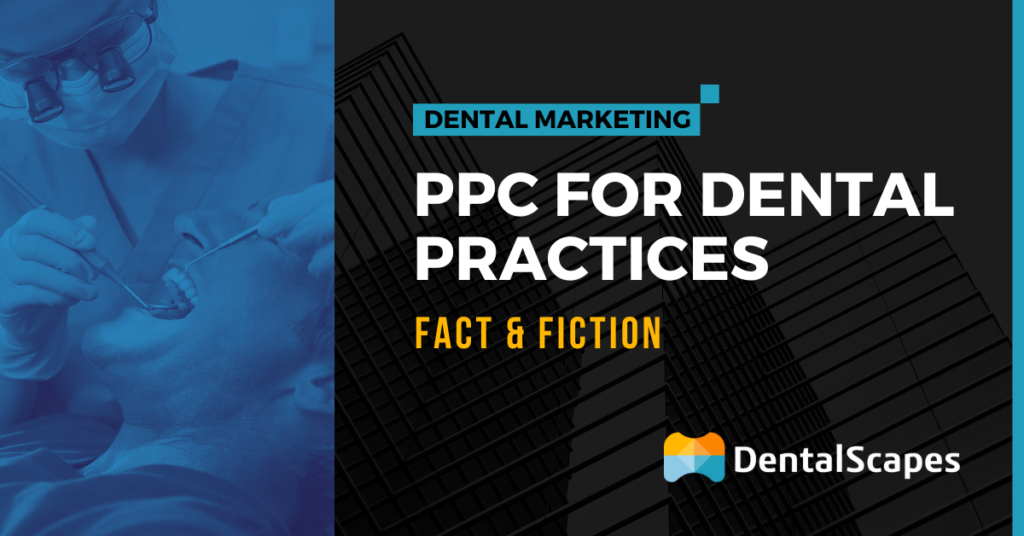PPC, or “pay-per-click,” advertising for dental practices typically refers to the paid ads that run across the Google search results page (SERP). Many dentists and orthodontists use PPC to reach potential patients — but many do not. So what’s the right call for your practice? The short answer is that it depends. An experienced dentist marketing agency can help determine if PPC makes sense for your practice.

Misconceptions in PPC for Dental Practices
The reality is, there are a lot of misconceptions out there related to PPC for dental practices. In this blog post, we’ll examine some of the more common “fictions” surrounding PPC for dentists — and the facts that you should keep in mind instead.
Fiction #1: PPC is too expensive for most dental practices.
The first complaint you’ll probably hear about PPC is that it’s expensive. And that can certainly be true. In our backyard of Raleigh, North Carolina, for example, you might expect to pay around $12 or so for a single click from the search term, “Raleigh dentist,” according to data from Ahrefs. Targeting keywords like “Raleigh orthodontist,” on the other hand, would likely cost a little more, maybe as much as $19 per click. It’s important to note that cost-per-click (CPC) varies widely by market and search term.
So… while $12 might seem like a lot to pay for a single click to your website, what really matters is what happens after they get there. If you have a high-performing dental practice website, you might expect your cost-per-call to ring in around $49, based on LocaliQ data. If your front office staff converts those calls into new appointments 50% of the time (and with the right training, that conversion rate can be a lot higher), that means your cost per new patient appointment is around $98. Compare that to the average value of a new patient appointment, and you’re probably looking at a decent return on investment (ROI) — especially if that patient continues to return to your practice and customer lifetime value (CLV) is high.
Also, while strong competition might drive up the cost-per-click (CPC) on “core” keywords like “Chicago dentist” or “Richmond orthodontist,” an experienced PPC manager can help identify and target less common but high-intent “long-tail” keyphrases. Example keyphrases include “how to fix a cracked tooth,” “Charleston dentist with Saturday hours,” or “what to do about tooth pain.” With the right targeting and bid strategy, your dental practice can leverage these types of search queries to stretch your budget and maximize ROI.
Fact: PPC can be expensive, but with the right strategy (including the right keyword targeting, ad copy, and bid adjustments), most dental practices can get positive ROI.
Fiction #2: With the right SEO strategy, PPC for dentists is unnecessary.
Search engine optimization (SEO) is critical to the online success of any dental practice. With the right SEO strategy (especially one focused on local SEO), your clinic can dominate the top of the Google SERP. The only problem, however, is that paid ads often run above the “organic” (or non-paid) search results. So even if your dental or orthodontic practice is killing it with SEO, your competitors can effectively crowd you out with PPC ads. This is an increasingly troubling problem for small to mid-size dental offices going up against larger group practices with heavier budgets.
So, even if your SEO efforts are driving a lot of traffic from organic search, PPC can help you own as much “real estate” on the Google SERP, effectively increasing the likelihood that a potential patient clicks on your link and schedules an appointment.
The other thing to keep in mind is that you might not see the true payoff of SEO for 1-3 months (or more). It simply takes Google time to process new and refreshed content, links, technical optimizations, and more. Results from PPC, on the other hand, are essentially instantaneous. With PPC for dentists, you can flick a switch and start seeing results right away, which is important for dental practices that want to increase patient volume quickly. In marketing, we often say that “SEO is a marathon, and PPC is a sprint.”
Fact: Strong SEO doesn’t make PPC irrelevant. Investing in PPC in addition to dental practice SEO can help you own the most “real estate” possible and increase your patient volume faster.
Fiction #3: PPC is “set it and forget it.”
Technically, it’s possible to set up and start running a PPC campaign for a dental practice in less than a day. And technically, you could let that campaign run indefinitely, maybe checking in from time to time to see what’s happening.
We don’t recommend it.
The fact is, PPC — like dentistry — is both an art and a science. The best outcomes are the result of careful planning and data-driven decision-making. That’s why, despite their best intentions, a dental PPC campaign is probably not best managed by a part-time office administrator, but rather a seasoned PPC manager who knows how to interpret the data and make the right optimizations to lower cost-per-lead (CPL) and cost-per-acquisition (CPA). With different ad formats, bid strategies, targeting options, and more, the most effective dentist and orthodontist PPC campaigns are those with expert eyes on them every single day.
Fact: PPC doesn’t run on autopilot — at least very well. Effective PPC campaigns for dentists require constant analysis and adjustments.
Interested in PPC for Your Dental Practice?
At DentalScapes, we design, develop, and manage PPC campaigns for dental and orthodontic practices to generate more leads and schedule more new patient appointments. If you’re interested in learning more about how PPC can transform your practice, book a free strategy call and let’s talk!
